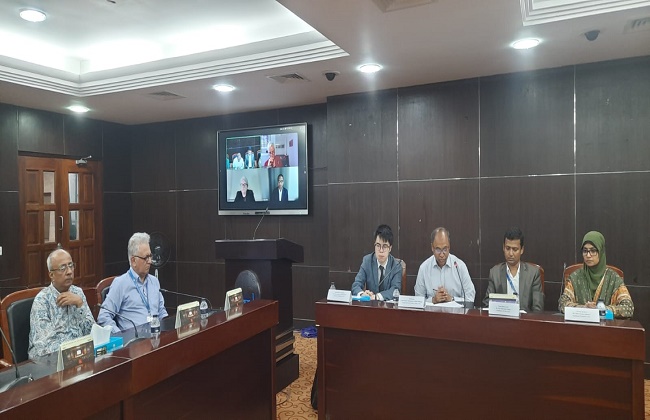
“Calling for the establishment of a truth and reconciliation commission in Myanmar to uncover the true causes and extent of the genocide,” said Dr. Mohammad Habib Ullah, General Secretary, Arakan Rohingya National Organisation (ARNO) in an international webinar on “Repairing the Harm: Restoring Justice for the Rohingya” to commemorate the 7th Rohingya Genocide Day on 24 August 2024 (Saturday) at 4:00 PM (BST) at NSU campus, a press release said. The event was organized by the Center for Peace Studies (CPS) of the South Asian Institute of Policy and Governance (SIPG) at North South University (NSU). The webinar convened a diverse body of local scholars and international experts to engage in timely discussions on the ongoing need for justice, international accountability, sustainable peace, and restoration for the Rohingya community stranded in Bangladesh and excluded in Rakhine, Myanmar, and beyond. The event was live-streamed on the official Facebook page of CPS, attracting a transnational audience.
Ambassador Laetitia Van Den Assum, Former Member of the Kofi Annan Commission, Dr. Emma Leslie, Founder and Director, Center for Peace and Conflict Studies and Dr. Mohammad Habib Ullah, General Secretary, Arakan Rohingya National Organisation (ARNO) virtually graced the webinar while another panelist, Dr. Md. Rizwanul Islam, Professor, NSU, attended the event in person. Dr. Abdul Wohab, Coordinator, CPS, coordinated the event.
Dr. Raymond Kwun-Sun Lau, Assistant Professor, NSU inaugurated the session by briefing the backdrop of the Rohingya Genocide and addressing the scholars along with the conference’s agenda to start off the session.
Ambassador Laetitia Van Den Assum began by focusing on the key question of achieving stability and peace for all communities in Rakhine, not just Rohingyas. She acknowledged the multiple crises in Myanmar, including security, economic, and human rights issues. She said, “Over the past nine months, we have observed how the Junta has employed a divide-and-rule strategy, exploiting the Rohingya for their own benefit. Now, we see Rohingya fighting against Rohingya, as both the Junta and the Arakan Army have recruited them to join their respective causes.” She called for an independent assessment mission to establish the truth and facilitate future reconciliation efforts.
Dr. Md. Rizwanul Islam, Professor, NSU said in the discussion “From a broader perspective, the Rohingya case was brought before the International Court of Justice (ICJ) by Gambia, a small country that took a courageous step forward. The ICJ accepted their case, which sets an important precedent.” He also said “The best remedy for the Rohingya is a safe and dignified repatriation to Myanmar. However, international justice has been reactive when it should have been proactive. These atrocities did not happen overnight.”
Dr. Mohammad Habib Ullah described the Myanmar military’s actions against the Rohingya people, including forced recruitment, violence, and the killing of women and children as they tried to flee. He expressed his frustration over the military’s continued oppression of the Rohingya, stating that they are following the same tactics they used in 2017 and earlier. Hence, Dr. Ullah calls for the international community to hold accountable specific military leaders who are directly overseeing the operations against the Rohingya. Dr. Habibullah concluded by emphasizing the significance of learning from history and ensuring that all crimes against the Rohingya people are accounted for, rather than going unanswered.
Dr. Emma Leslie acknowledged the long-standing struggle of the Rakhine people for self-determination and the inequities in how the resources of the region have been exploited by the central government. She emphasized the need to look beyond just the military’s actions and address the deeper issues of marginalization, militarization, and the divide-and-rule strategies that have plagued the region for decades. She stressed pursuing restorative justice and conflict transformation, where the relationships between the different communities in Rakhine can be restored. She asked for urgent action to create safe spaces for dialogue, not just with the military, but with a broader range of stakeholders like the National Unity Government and ethnic armed organizations advocating the need to facilitate greater access and transparency in the region, allowing media and others to visit and document the situation on the ground.
Engaging questions from the participants livened up the discussion. NSU and SIPG faculty members attended and provided insightful questions and commentary during the open session. The question-answer session addressed a range of crucial issues related to the Rohingya crisis, highlighting the necessity for a comprehensive, rights-based, and accountable approach to developing sustainable solutions.
Dr. Ishrat Zakia Sultana, Assistant Professor, North South University (NSU) called the webinar advocating for a pragmatic, values-driven approach that addresses humanitarian needs while supporting political solutions and accountability; hoping that the path forward will shift from violence to deeper dialogue and pragmatic political solutions for all the people of Rakhine.
Ambassador Mohammad Sufiur Rahman, Senior Research Fellow, SIPG, NSU facilitated the discussion as a moderator and addressed the scholars along with the conference’s agenda to inaugurate the session. He said “The Rohingya community has been devastated since 2017. The situation for the Rohingya continues to deteriorate. We must look beyond humanitarian needs and focus on long-term solutions.”
